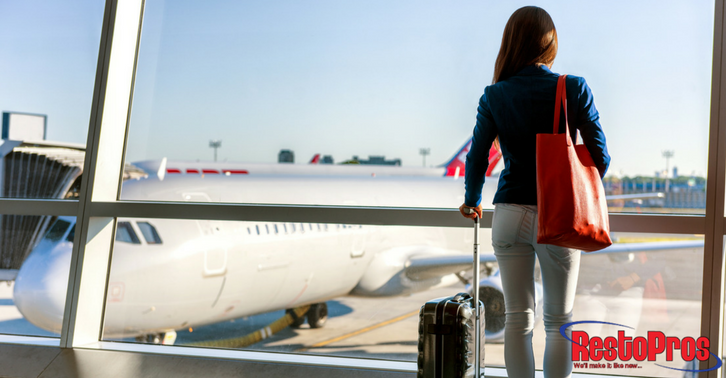 So maybe it’s not the thing that’s on everyone’s mind while they’re travelling, but mold doesn’t stop growing just because you aren’t there (in fact, it usually grows better without you since you aren’t there to stop it). So whether you’re just worried about being sensitive to mold and pollen during your travel or concerned over whether or not the next rain is going to leave enough moisture on your window sill to start a mold colony, worry no longer because we’ve got some guidance to help you out while you’re on the road!
So maybe it’s not the thing that’s on everyone’s mind while they’re travelling, but mold doesn’t stop growing just because you aren’t there (in fact, it usually grows better without you since you aren’t there to stop it). So whether you’re just worried about being sensitive to mold and pollen during your travel or concerned over whether or not the next rain is going to leave enough moisture on your window sill to start a mold colony, worry no longer because we’ve got some guidance to help you out while you’re on the road!
Prevent Mold While on the Road
When you’re out travelling, the last thing you want is to end up sick, ill, or caught in an unstoppable sneezing fit. That means that you don’t to stuck in a room that’s infested with mold or carrying suitcase with even a minor amount of mold growth.
One piece of advice we’ve received from those who travel abroad is to blow your nose every day. It sounds a little silly, but keeping a clean nose (or using a saline nose wash each day) helps to clear out dust and mold spores that cling to the inside of the nasal cavity, preventing buildup. Of course, common-sense actions like not staying in a musty-smelling room or a dust-filled hotel will also help you stay healthy. Carrying your own dust-proof pillow case is a great way to protect yourself if you have allergies or are worried about mold spores. Just be sure it’s clearly marked and that you take it home with you when you leave.
You should also make sure that you place a desiccant in your suitcase, especially for the travel bag that’s going to be carrying your dirty laundry while you travel. If you don’t have the opportunity to wash clothes while traveling, the mold spores that land on clothing can build up over time and a desiccant in your suitcase will help to prevent moisture buildup from condensation or even perspiration while you travel. If you’ll be travelling for more than a week, consider investing the hotel’s laundry services or stop by a laundromat for a couple of hours.
Protecting Your Home
Clearly, taking preventative measures to protect your home while you’re gone will be similar to the steps you take to protect your home while you’re there. There are a few extra steps you should take since you won’t be able to keep an eye on things while you’re out.
Inspect for Leaks: The first step is to make sure there aren’t any leaks in your home.
Pressure Leaks: Water heading toward a faucet, shower head, or even a toilet is under pressure. If there’s a leak here, it’s usually pretty obvious. Constantly filling toilets, dripping sinks, or puddles of water will become apparent very quickly if the leak is on a pressurized side of your plumbing system. A quick visual inspection of your home should reveal the leak.
Return Water: Returns from fixtures, faucets and appliances are usually gravity assisted, rather than being pumped away. This makes finding a leak from waste-water lines incredibly difficult. The signs of a return-line leak are usually caused by puddles, warping floorboards, and stained walls. To find a leak that hasn’t caused any damage yet, you’ll need a professional to examine your home for the leak.
Inspecting for roof leaks is difficult and all of these inspections are even more difficult if you live in an apartment complex. Still, it’s worth making a visual inspection and looking listening for any drips.
Humidity Control: Turning off your air conditioner or heater may sound like a good idea, but during the winter, a snap freeze can rupture pipes leaving you with a flood or drip that will deliver a lot of water damage. During warmer months, heavy rains can leave your home excessively humid. Yes it’s smart to turn off climate controls to save money, but it’s smarter to turn them down (especially if you have a smart thermostat) to help regulate humidity in your home.
Ask a Friend to Check: If you don’t have a smart thermostat and didn’t have time to inspect your home, ask a friend to drop by while you’re out, especially if it’s going to be stormy that week. If it’s humid they can run a dehumidifier or your air conditioner to dry out the air for a bit.
Turn off the Water: If you’re going to be gone for three weeks or more, turn off the water. Turn off your hot water tank and drain the water from it and your plumbing lines. Defrost the refrigerator and make sure that there is no ice left inside and unplug it as well. Leave not source of moisture undrained. Just remember that you’ll need to run water through your lines first to clear out any bad water and you’ll need to refill your hot water tank before turning it back on again.
So remember, travel dry, keep your nose clean, and have someone drop by your home from time to time to make sure that no water has started running through the halls and you’ll be fine. Enjoy your next vacation!
Don’t forget to follow RestoPros on Facebook, Twitter, LinkedIn, and Google+ for new Updates, News, and Discounts.
